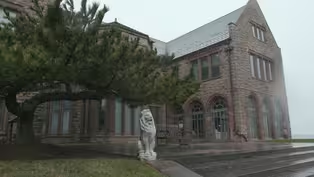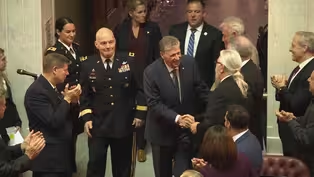
Green Seeker: Whaling and Weather
Clip: Season 6 Episode 3 | 8m 19sVideo has Closed Captions
Old whaling ship logbooks in a local library may offer up new insight into climate change.
An unlikely project is unfolding at the Providence Public Library. Local historians and scientists are extracting and analyzing weather observations made by mariners in the logbooks of whaling ships from the 18th and 19th centuries and then comparing them to meteorology recorded in the same areas today. Researchers say the old voyages could provide new insights into climate change in coastal areas
Problems playing video? | Closed Captioning Feedback
Problems playing video? | Closed Captioning Feedback
Rhode Island PBS Weekly is a local public television program presented by Ocean State Media

Green Seeker: Whaling and Weather
Clip: Season 6 Episode 3 | 8m 19sVideo has Closed Captions
An unlikely project is unfolding at the Providence Public Library. Local historians and scientists are extracting and analyzing weather observations made by mariners in the logbooks of whaling ships from the 18th and 19th centuries and then comparing them to meteorology recorded in the same areas today. Researchers say the old voyages could provide new insights into climate change in coastal areas
Problems playing video? | Closed Captioning Feedback
How to Watch Rhode Island PBS Weekly
Rhode Island PBS Weekly is available to stream on pbs.org and the free PBS App, available on iPhone, Apple TV, Android TV, Android smartphones, Amazon Fire TV, Amazon Fire Tablet, Roku, Samsung Smart TV, and Vizio.
Providing Support for PBS.org
Learn Moreabout PBS online sponsorship(wind whooshing) Observations of winds that once buffeted this 1800s whaling ship are offering up some critical clues to climate change.
The Charles W. Morgan is an attraction at Mystic Seaport Museum.
It's the last of an American fleet that once numbered close to 3,000, and the oldest wooden commercial whaling vessel still afloat.
Ship logbooks of its many whale hunting voyages, along with hundreds of others from New England, may provide a treasure island for researchers trying to learn more about extreme weather challenges.
- Oh, wow.
- [Pamela] The idea to take a deep dive into weather data from centuries-old logbooks was launched by Timothy Walker, sailor, marine historian, and professor at UMass Dartmouth.
- These logbooks hold a lot of information about weather because the whalers were taking daily and multiple times a day, they're writing down the winds and the temperatures and the wind direction and wind speed and so on.
And so we wanted to know if we could extract that weather data to inform climate science, and it turns out that you can.
- [Pamela] Walker came to New Bedford to crew on the historic Schooner Ernestina.
One of his shipmates happened to be working on his PhD in climate ocean science.
- And he and I had talked about a way to do something with both of our skill sets.
- [Pamela] That discussion led to Walker fishing for weather information from the logs of local whaling ships and comparing it to the meteorology in the same coordinates today, - They're going to places where other ships don't go, because merchant and military ships by the 1650s or so, they're following seaborne highways that they know is the most efficient way to get from place to place.
The whalers are following the whales, who go to some of the most remote parts of the world's oceans, and so they're recording weather data in places where we simply don't have any other way of knowing what the weather was like on a particular day, at a particular place, 150, 200, 250 years ago.
And this kind of information for climate scientists is absolutely priceless.
- These are the areas where we can pick up the different high pressure systems and how they are changing.
- [Pamela] Walker's voyage of discovery resulted in a collaboration with Woods Hole Oceanographic Institute on Cape Cod.
Scientist Caroline Ummenhofer says she was all on board.
- When Tim reached out to me six years ago about this project, that there's maritime weather data contained in ship logbooks, that seemed a real boon to trying to understand how wind patterns, how pressure patterns are shifting out over the oceans.
- Ummenhofer says her research is probing the ocean's role in climate variability and its effect on rainfall, droughts, flood, and extreme weather events.
And how does this help us in dealing with climate change?
- We've analyzed 170 logbooks, and we have over 100,000 daily weather entries, which is amazing, covering the period 1790 to 1910, with most of the data from the 1840s to '60s, which was the heyday of the New England whaling era.
We can compare that to modern-day observations that we get from satellites or meteorological stations.
It helps us put recent trends into a long-term context.
For example, one area that we know has experienced large wind changes is the Southern Ocean.
- [Pamela] Ummenhofer says there is a strong belt of westerly winds, which can carry storm systems that are churning around Antarctica.
The whalers called them the Roaring Forties.
They've shifted further south in recent decades, and she says it's now more like the Furious Fifties.
- It might sound strange, like what do we care about the winds over the Southern Ocean?
It's actually pretty important because rain-bearing weather systems travel on these westerly winds.
And as these winds have shifted further south, they have left regions like southern Australia and southern Africa high and dry, and they are experiencing much more frequent drought in recent decades than they have had in the past.
- The Providence Public Library has some 800 whaling ship logbooks in its special collections, second only to New Bedford.
These were considered legal documents in their day.
Sailor-carved ink stamps indicate how many whales were caught on a particular date and where.
- Sometimes recording are what are called offing sketches, which is helping them to navigate.
- [Pamela] The ledgers are filled with remarkable folk art illustrations of life on the years-long journeys.
Eyewitness accounts of mutinies, shipwrecks, mayhem, and murder.
Walker says it's easy to become distracted by the drama while collecting the data.
He notes whalers harpooning the mammoth creatures were often pulled out to sea on what's known as a Nantucket sleigh ride.
There are also reports of tragedies in the treacherous waters as he read in one gripping encounter.
- Each whaling boat has five men.
So three boats went out to hunt whales, a storm brewed up, they lost those boats and they lost those men, so they lost about a third of the entire crew in one storm.
- [Pamela] Yet the risk didn't deter the mariners.
Whale oil was profitable and essential for lamps and for fueling machinery of the Industrial Revolution.
- This is nice.
It says, "Bound Around Cape Horn," which sounds like a sea shanty, and it is.
- [Pamela] While the whaling logs, usually written by the first or second mate, are often digitized, archival researchers have to go online to decipher the old cursive handwriting detailing weather observations and locations.
While Walker says he enjoys the history captured in the logbooks, he now has his sight set on the science.
- As a historian, it's rare that you get a chance to do something that's so topically important and so, you know, vital to survival as a species, to our learning to grapple with climate challenges today.
- Is there any way that you see that this research is ultimately gonna help communities prepare for extreme weather?
- As we have a better sense of how storms, and in particular wind patterns, that are associated with extreme events, how they have changed in the past, that gives us more confidence into how they are going to change in the future.
- We can point to data, and we can speak to climate skeptics and say, "Yes, this is really happening," and we have to inform ourselves so that we're in a better position to react to a changing climate.
And that's another goal of our project, is to be able to provide the tools for public policy, for homeowners along the coast to be able to deal with what's coming along the path in the 21st century regarding climate change and extreme weather events.
Video has Closed Captions
Clip: S6 Ep3 | 10m 21s | What happens when climate change causes sea level rise threatening Rhode Island’s history? (10m 21s)
Video has Closed Captions
Clip: S6 Ep3 | 5m 12s | Governor Dan McKee addresses Rhode Islanders in his annual State of the State speech. (5m 12s)
Providing Support for PBS.org
Learn Moreabout PBS online sponsorship
- News and Public Affairs

Top journalists deliver compelling original analysis of the hour's headlines.

- News and Public Affairs

FRONTLINE is investigative journalism that questions, explains and changes our world.












Support for PBS provided by:
Rhode Island PBS Weekly is a local public television program presented by Ocean State Media

